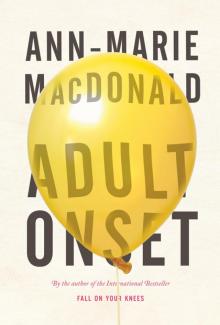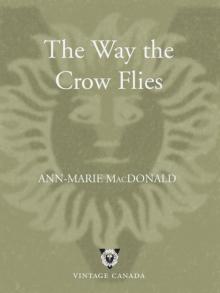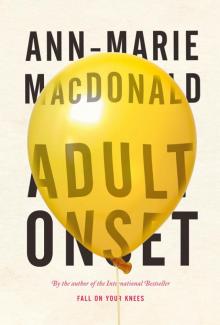- Home
- Ann-Marie MacDonald
Adult Onset Page 5
Adult Onset Read online
Page 5
They were not allowed to play out there by themselves, especially if there were buckets that could be overturned and used to scale the railing. It is normal for a mother to be vigilant, and Maureen recalls being punished for leaving the buckets out there, but it does not surprise Mary Rose that their mother was especially anxious, having already lost one baby. Or was it two at that point? When exactly was Alexander born? By the time Mary Rose was big enough to swim the world’s oceans on a balcony she would have been around two. In any event, there was definitely one occasion on which she and her sister Maureen found themselves on the balcony together all alone.
“The time you hung me over.”
“Mary Rose, you must have dreamt that!”
•
He hires a German woman to look after the baby during the day while he is at work and his older girl is at school, but every night, he rises at the first cry. He fumbles with bottles and pricks himself on diapers pins. He walks the floor, the little wailing face damp at his neck. Though his Basic Military Training has given him stamina, nothing in his upbringing has prepared him for the heart-gaping loneliness of a baby in the night—or the depth of comfort in his power to console her. He rocks her against his chest, her toothless gums suckle his bare shoulder.
“There, there, it’s all right, now. Daddy’s got you.”
•
The grounds around the apartment buildings where the military “dependants” lived were immaculately tended, lindens had been planted and mulched, sidewalks led to the operational side of the base where her father worked and the jets took off. But a stone’s throw from their building, just beyond the new wading pool and the old bunker, was the Black Forest. It was not a wilderness in the North American sense, laced as it was with pathways that locals and military families alike set out on for weekend Wanderungen, but it was dense. The trees, mainly conifers, grew close together, blocking the sun, hence its name; shade rendered the floor springy with moss, mysterious with mushrooms, and lively with streams that trilled down from the Alps, the whole effect both enchanting and forbidding. If you strayed from the paths and ventured deep enough, you might be charged by a wild boar or lured by a talking wolf. Maureen told her that at Christmastime elves decorated the trees at the heart of the forest but no one except Santa Claus had ever seen them.
•
His wife is released from hospital a month or so later and Duncan lets the German woman go. Dolly has put her foot down: there is no longer any need for help during the day. “I’m the mother.” Nor, she makes clear, is there any need for him to walk the floor in the night.
•
Dolly’s unabashed love of getting to know people and places, her fearless brand of absurd Kanadische Deutsch, endeared her to the local Frauen, who looked as though they hadn’t smiled since before the war. She dressed little Maureen immaculately, pulling tight her braids, meeting with approval wherever she went—“Aber schön!” Maureen flanked her as she pushed the pram with the baby in it—the second Mary Rose.
There were parties at the Officers’ Mess, glittering affairs with dance bands and smorgasbords—a far cry from perogies and the occasional standing roast in Gimli. Mary Rose cherishes the recollection of her mother in an evening gown, posed next to her father in his formal mess kit—what he called his “monkey suit.” Or perhaps she cherishes the stories.
Dolly got herself elected head of the Wives Club: a well-oiled machine whose pecking order mirrored the husbands’ ranks, it was not without its political hazards. She unseated the CO’s wife, Eileen Davies—who put a brave face on things with the offer to spearhead a commemorative recipe book—and found herself at the nerve centre of a domestic, festive whirl, from parties and welcome wagons to school concerts, bazaars and making sure every mother who needed a hand got one. Dark little Dolly from Sydney, Cape Breton, discovered she could run things. Her husband wasn’t surprised. “Why d’you think I married you? It wasn’t just for your looks, Doll Face.” She laughed at him, because he really did think she was pretty. When she was fine, she was very very fine.
•
But she is still tired. The more so, now that she is up in the night with the baby. When it naps in the day, so does she, on the couch in the living room facing the coffee table. Beyond it is the glass door to the balcony. Above the railing is sky, below it, bars. Are they close enough together to be safe for a baby? She gets up to check.
Outside, the trees that shaded the grounds in summer are bare and look to be cowering. But the evergreens that hem the base appear to have drawn closer. She smells snow. She returns to the couch and lies back down. She hears the baby crying. She has never lived in an apartment before, high above the ground with a million-dollar view. She never dreamed she would be living in Europe, married to the nicest man in the world. She always knew she would have babies, but thought she would be more like her own mother when the time came. She is not crying, her eyes are leaking. Her breasts are leaking too, but that will stop on its own—her milk is no good. Nowadays formula is better anyway.
She hears a baby crying. What day is it? It must be a weekday, her older girl is at school, her husband at work. She gets up and goes in. The baby cries whether she picks it up or not. Whether she feeds it, changes it, rocks it, bounces, shakes—the baby looks at her as though it knows something about her.
“Mary Rose,” she says. And her voice sounds flat in her ears. As though she is telling a lie.
The cuckoo clock strikes the quarter hour.
•
During the day, Duncan “flew a desk” just as he had back in Canada, but no longer mourned his lost chance at aircrew—with his blue eyes and boxer’s reflexes he had been a shoo-in. He was disqualified when the Wing Commander saw that, in the box next to Marital Status, he had ticked “married.” In those days, the jets were “widow makers” and the military, fresh from the Second World War, had enough of those on their hands. But the view from behind a desk was more interesting over here in Europe, to say the least. He was at the “sharp end,” and not just of a pencil but of the Cold War. The Soviet Union was a thirty-second muster away. “Logistics” took on a whole new meaning in this context, and every day at sunset when he held his little one on the balcony, he understood the meaning of Peace. And that he had a role in it.
•
Is she letting it cry too long? Babies need to cry in order to strengthen their lungs.
The daylight on the balcony stays the same for a long time. She would like to go out there in the sun … But she feels too heavy.
She is lying on the couch facing the coffee table.
A baby is crying.
The sun has moved.
It is quiet now.
Someone is knocking at the door.
What day is it?
Someone is knocking at the door. Is it today or yesterday?
A woman’s voice: “Hi there, Dolly, it’s Eileen, I’m here with Mona …”
She closes her eyes.
Mona’s voice: “Dolly, if you’re home, dear, open up, we’ve come with a stew.”
She turns to face the back of the couch.
Eileen: “Think of Duncan, dear.”
At the door, she tells them she was lying down with the baby. They look in on it. “She’s beautiful, Dolly, she looks like you,” says Mona.
“Reheat it in the oven at three hundred and fifty degrees,” says Eileen. “And put on some lipstick.”
•
Duncan knew his wife was rundown for a while after the baby was born, but she bounced back. Some men came home to women who looked as though they’d spent the day with their head in a dirty oven, but those women weren’t air force wives. Even so, most women couldn’t hold a candle to Dolly.
“You look right jazzy, Missus, what’s for supper?”
“I made a stew.”
“My favourite.”
•
Babies die, it happens. Crib death. If you think a thing, it might happen … Think nice thoughts. But dread invades the living room, finds her on the couch, presses on her, gets inside her where it swiftly grows bigger than she is until she is inside it, looking out from a rind of shadow. Anything could happen to her baby. It could drown in the tub, it could fall from the balcony. It could be taken from the stroller while her back is turned. The hired German woman could come back and steal her. As long as her baby is here, she can be taken away. It is almost as if, as long as the baby is alive, the baby is not safe.
Is this sleep? It is not wakefulness. There is the coffee table, there is the glass door, there is the balcony. There is all this, so there must be someone seeing it. There must be an “I.”
A baby is crying.
After a while, it stops.
The baby does not cry as much now. Some days, not at all. She gets up and goes in. It is not moving, but it is awake. It is a dark little thing. It stares up at her and she understands the problem. “My baby doesn’t like me.”
“Are you feeling better today, Mummy?”
Her older girl has turned out to be a good little helper. Home from school every day at three-thirty. “Maureen, watch the baby while I put supper on.”
At five o’clock: “Maureen, set the table while I get dressed.”
And when he comes in the door: “Don’t you look snazzy, Missus, what’s the occasion?”
One day it is as though a clock has restarted inside her. She is back. Time is the best medicine.
“Golly Moses, Mary Roses!”
The baby chuckles and the sound reminds her of a packet of Chiclets.
“Cuc-koo!” she says, popping out from behind her hands like the painted cuckoo from the clock. “Cuc-koo!” The baby mirrors her big smile.
She cannot for the life of her understand what was bothering her all
winter when she could hardly get up off the couch. “What was the matter with me anyhow, Dunc?”
“Not a thing, you had a baby, you were tired.”
“I was right blue, when I think about it.”
“Don’t think about it.”
The baby pulls herself up by the coffee table. “Dunc, come look at your daughter, dear, she’s standing!”
“Atta girl, Mister!”
•
Children were not permitted to play in the Black Forest by themselves, but there were other attractions to make up for the nice new playground’s lack of allure. A concrete bunker was left over from the war; slits for gun barrels and pockmarks from bullets attested to its authenticity. If you had been standing in that spot twenty years ago, you would have been shot. An iron plate was welded into the ground, and Maureen told her it led to an underground bomb shelter with food and a nice table set for supper, and a playroom for the children. Then she added that Hitler had died down there. Starved and turned into a skeleton. “He’s still down there, sitting at the table with a cup of tea.” Mary Rose took it in. Hitler was a word. It had “hit” in it. Everyone knows you must not hit. One day an older boy showed up in his father’s old gas mask. Blank glass eyes, obscene wrinkly snout, no ears—her first memory of fear.
•
The following spring, she gets the best news of all. She is pregnant again. She is going to have another baby, maybe even a boy. She has no right to be anything but happy.
•
The next baby lived long enough to be baptized, so his name really did belong to him. Alexander. Mary Rose saw the grave when they visited it one day in spring; remembers looking down at it, with her hands folded. She was wearing white—it matched the stone tablet, flush against the grass. Her mother’s sweater was draped comfortingly over her shoulder—she recalls the gentle pressure of her mother’s hand, holding it in place. Mary Rose broke the silence: “Why is he down there?” Her father replied just as gently, “Shhh.” And she realized her question had been shamefully rude. She also realized she was supposed to know the answer already. But again, perhaps she merely remembers the photograph; a black-and-white snapshot in the old album that she used to pore over secretly. At the time her father took it she could not have been more than two—three?—even so, she knew the difference between a bunker and a grave. Hitter was in one. Her brother was in the other. At the edge of a forest full of Christmas trees.
With the passage of years, he became Alexander-Who-Died. His myth remained static, like his reddish hair and yellow receiving blanket—details her father never fails to include. Yellow, perhaps, for the jaundice that killed him. “There was nothing wrong with him that couldn’t be fixed nowadays …” In Mary Rose’s mind he is suspended, wrapped in his yellow blanket, like a setting sun. There is no date, no season, nor any sense that the image might belong to a sequence. A single station of the cross. Like myth, it is outside time, where it endures, as mute as the graveside photo to which she returned over and over as though hoping each time to see something new. Until one day she opened the album and it was gone.
•
The priest performs the baptism just in time, and the nurse asks the young air force officer if he would like to hold the baby. He nods and she places his son, wrapped in a yellow receiving blanket, in his arms. The corridor is strung with tinsel. At the nurses’ station a small tree stands on the counter.
They have named him Alexander.
•
Mary Rose was shy of her fourth birthday when they were posted back to Canada, across an ocean of time. They left him behind. Just as they left behind the sky, the treetops, the balcony and the big hot sun going down. Time was severed, and began again. “We’re home, kids.” Snow. English. Bold seasons, big roads. Different smell. School. “Pay attention!” Trenton air force base, with not a honey wagon in sight, and the air full of the clumsy rumble of Hercules supply planes. Always in view was the vastness of what in most countries would be called a sea but in Canada was known simply as “one of the Great Lakes.” Ringed with industry, home to “the Thousand Islands” and divided lengthwise by the US border, Lake Ontario was a burial vault for shipwrecks and waste, or an azure immensity, depending on the season and where you stood. They lived on a base again but graceful lindens and glistening apartment buildings had given way to three styles of serviceable houses, immaculate with not a garden to be seen—gardens were long-term propositions. “One of these days, I’ll plant a tree,” mused her father. Her brother was born there—her brother-who-lived—and then they were posted again, three hours west down the 401 to Hamilton. See Jane run! Different city, same lake. New school. See Jane fall!
With each move the MacKinnons left something behind: broken toys, outgrown clothes, babies. What they left they did not remember so much as mythologize. Mary Rose left her tonsils in Hamilton. Though less lyrical than a heart left in San Francisco, they did, according to her father, enjoy the distinction of being flushed into the Niagara sewage system and going over the Falls. “Now you can say you’ve been over the Falls without a barrel,” he said with a grin. It made her feel quirky and brave, took the edge off the fiery sword in her throat.
She got older and realized her tonsils had more likely been incinerated as hospital waste and gone up the smokestack. In any case, they were somewhere. Everything was. Each night in her prayers: “God bless Mum and Dad and Maureen and Other Mary Rose and Alexander-Who-Died and Andy-Patrick and the other Others …” The latter were the souls of her would-have-been siblings. They accounted for Dolly’s frequent, “There would have been seven of you kids, not three. Or wait now, you might have been eight.” The miscarriages. Nameless “others” who became part of family lore, like Other Mary Rose and Alexander-Who-Died.
The Rh factor was responsible for all the deaths: the first pregnancy is fine, but after that if the fetus’s blood is not Rh negative, the mother’s antibodies attack it. Mary Rose has always thought of herself as a lucky person, a belief rooted perhaps in having been born between two dead siblings: she won the blood-type roulette. It is why she is here—that, and the fact that her older sister didn’t drop her from the balcony back in Germany.
There is a cartoon she once came across in the New Yorker: A kangaroo stands on a busy street corner. At its feet, face down on the sidewalk lies a man in a business suit, a bullet hole in his back. The kangaroo’s eyes are shifted guiltily to one side. The caption consists of its thought: That was meant for me.
Whenever the past started piling up behind Mary Rose, threatening to collapse, the family would move and presto, she would get another second chance. She got good at being new. They all did. The MacKinnons were always new, always almost just like everyone else. Always next door to normal. It was like growing up in the witness protection programme without changing your name.
It isn’t just luck—her shiny life despite the cold draft at her back. Although she will not say it aloud, Mary Rose MacKinnon believes herself to have been the beneficiary of divine intervention. A feat for an atheist. Her grade one teacher had written “slow” on her report card back in Trenton. It was a designation that dogged her through two schools and was set to blight the third when they were posted four hours back up the shore of Lake Ontario to Kingston.
It was known as the “limestone city,” with its historic forts and prisons, its universities and hospitals. Numbered among the latter was the loony bin, which was what everyone called The Ontario Hospital—itself a name that had acquired, by its very blandness, a sinister aspect. Kingston was where Sir John A. Macdonald, Canada’s “Father of Confederation,” had hatched the plot that would become a country, and the older buildings harboured a trillion stories, constructed as they were of the fossilized remains of plants and animals that had gone to sediment and turned to stone.
She was set to enter grade four at Our Lady of Lourdes Catholic School when Duncan made an appointment to see the principal.
Mary Rose was, by then, accustomed to being slow. Other kids would unaccountably take books from their desks and turn to page seventy-nine, or produce potatoes they’d brought from home and commence carving them into letters, dipping them in paint. She could neither draw a simple circle nor colour inside the lines. These were yardsticking offences. The blows were not severe, it being more about the humiliation factor: boys got the yardstick. To be a girl and get the yardstick meant you were outcast. Mercifully, she was already so otherwhere, she was unaware of being cast out. It began in kindergarten when she failed nap, and went downhill from there.

 Adult Onset
Adult Onset Belle Moral: A Natural History
Belle Moral: A Natural History The Way the Crow Flies
The Way the Crow Flies SSC (2012) Adult Onset
SSC (2012) Adult Onset